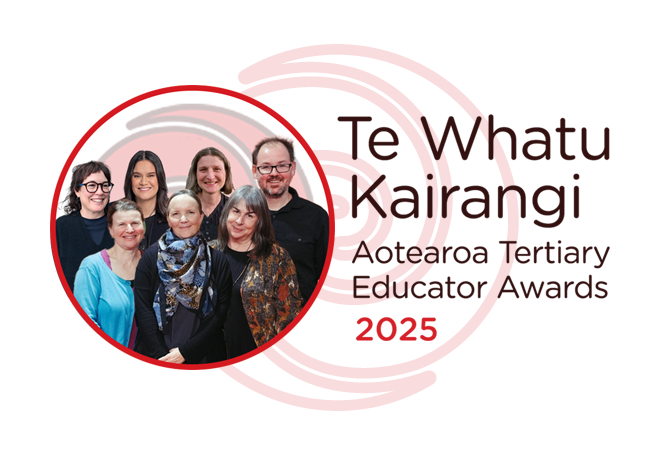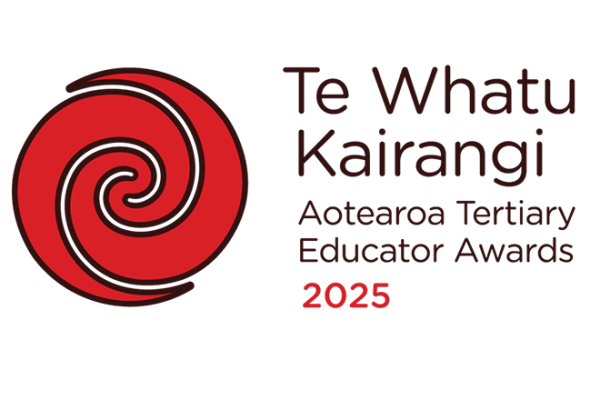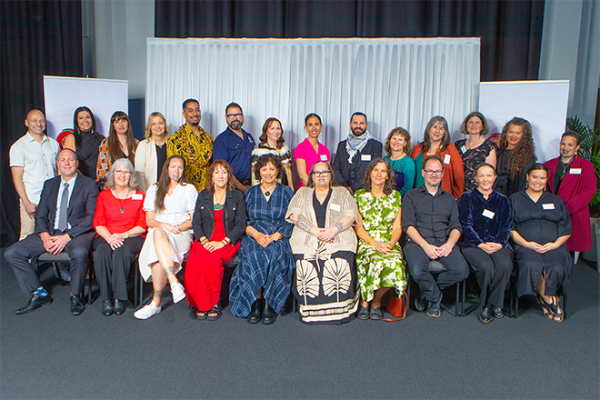New Zealand Sign Language (NZSL) Team
Empowering the Deaf community through allyship
Group Category winner: Progressing educational partnerships and collaboration
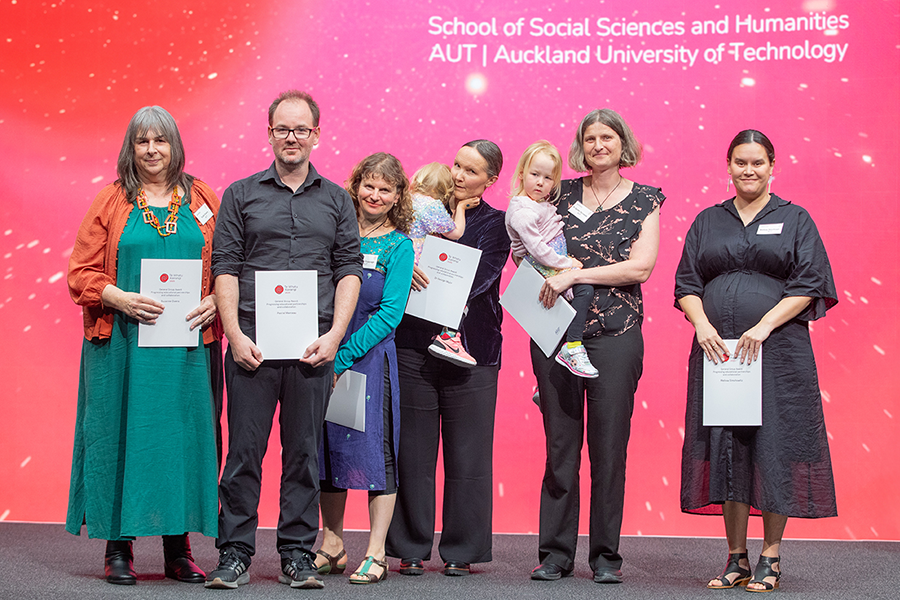
Left to right: Susie Ovens, Pascal Marceau, Rachel Coppage, Dr George Major, Dr Agnes Terraschke and Melissa Simchowitz.
The New Zealand Sign Language Team from the School of Social Sciences and Humanities, Auckland University of Technology | AUT
- Dr George Major
- Susie Ovens
- Rachel Coppage
- Pascal Marceau
- Rebekah Guy
- Dr Agnes Terraschke
- Melissa Simchowitz
"Our teaching methods model positive Deaf-hearing partnerships to build learners’ competence and confidence as interpreters and allies to the Deaf community."
The New Zealand Sign Language Team of Auckland University of Technology is a specialised team of three Deaf and four non-deaf academics teaching New Zealand Sign Language (NZSL) and NZSL-English interpreting in the Bachelor of Arts, located within the Faculty of Culture and Society at Auckland University of Technology (AUT). AUT is the only university in Aotearoa that offers majors in NZSL. NZSL and Deaf Studies prepares ākonga (students) to sustain positive, linguistically and interculturally competent relationships with Deaf colleagues, clients, customers and learners. The NZSL-English Interpreting major is an intensive programme which is accountable to the Deaf community and stakeholders and produces qualified entry-level interpreters who are safe to practise upon graduation.
The NZSL team draws on diverse experiences for the benefit of their learners. With a professional background in interpreting, George Major leads most of the practical interpreting courses, co-teaching with Susie Ovens for expert Deaf eyes on students’ NZSL output. Rachel Coppage focuses on Deaf culture and agency in her teaching, while Pascal Marceau introduces beginner signers to NZSL through immersion. Susie leads more advanced NZSL courses and supports students to develop NZSL proficiency through community engagement. Rebekah Guy and Melissa Simchowitz are experienced professional interpreters, specialising in practical NZSL-English interpreting courses, and Agnes Terraschke coordinates real-world work experience for final year interpreting students.
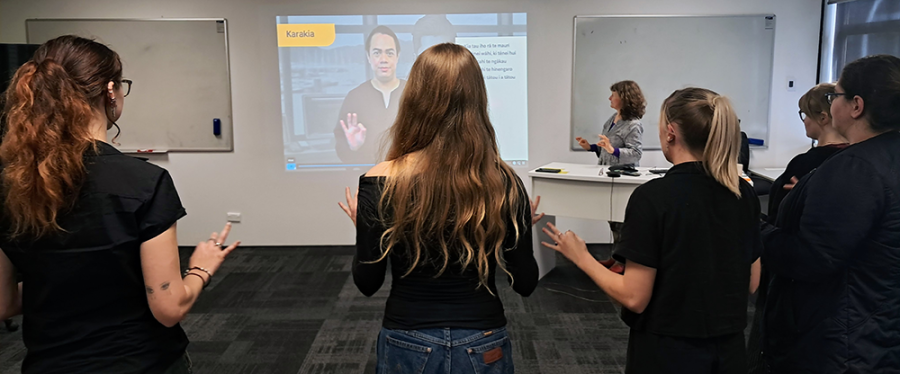
Across the two majors, ākonga are both Deaf and non-deaf and come from multi-lingual backgrounds. EFTS enrolments across 2018-2024 totalled 265, of which 43 (16.2%) were for ākonga Māori and 37 (14.0%) were for Pacific learners. AUT’s Graduate Destination Survey data 2018-24 shows that 100% of respondents from the NZSL Interpreting and Deaf Studies majors are in full- or part-time employment.
The NZSL team’s practice is based on allyship between Deaf and hearing communities. The team reinforces this approach by fostering active partnerships with diverse stakeholders, ensuring authentic learning opportunities in the community for their ākonga. Their innovative curriculum sustains social wellbeing for the Deaf community in Aotearoa and influences interpreter training practices internationally. The team helps students identify deficit-oriented attitudes and encourages Deaf gain to support Deaf self-determination. All their language classes are immersive so, from day one, hearing students are immersed in a NZSL world with a Deaf teacher. Students are taken into the Deaf community where they observe, interact, reflect, and share their experiences. They are asked to critically analyse audism as a form of discrimination against Deaf people, and to explore their own positionality. In this way, the team shapes its ākonga into respectful professionals who also understand the need for self-care and avoidance of vicarious trauma when working alongside potentially vulnerable clients.
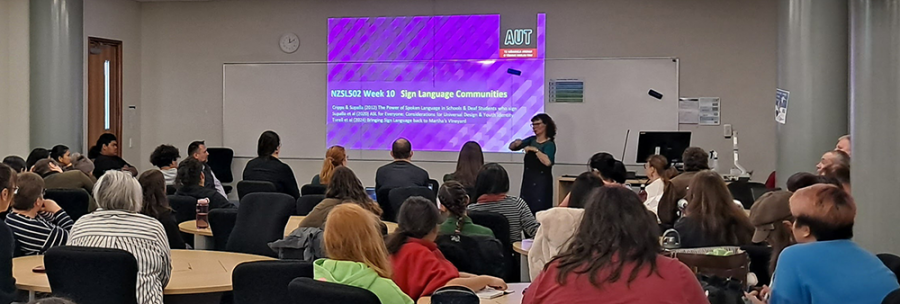
The team also works across the university to support hauora for all Deaf students at AUT as they navigate the complexities of studying at a mainstream English and hearing-dominant institution. This includes; student advising additional to their regular workload, assessment equity, supporting refugees, and safety, such as campaigning successfully in 2023 for a fit-for-purpose alert system. The team find Deaf and hearing co-teaching in the interpreting classroom contributes to the authenticity of teaching practice and assessment. For example, within the live ethical decision-making role-play examination for final year interpreting students, students are exposed to the realities of interpreting in the safety of the classroom using Deaf and non-deaf actors. The team presented learnings from this Deaf/non-deaf partnership approach at the World Association of Sign Language Interpreters Oceania conference in August 2025.
The team believes inclusivity means not only making the classroom an accessible and safe place for all people but also actively making space for learners from marginalised backgrounds, such as disabled, gender diverse, neurodiverse, deaf and hard-of-hearing, to be confident in their own identity. Deaf academics in the team, who have experienced the “illusion of inclusion” in their own education, model teaching with confidence in an institution where English is the dominant language and academic expectations are deeply entrenched in English. In early theory classes, video materials and live class discussions are interpreted by a team of professional NZSL-English interpreters. In a reversal of the more usual experience, Deaf and signing ākonga are advantaged and can have direct communication with the lecturer, while non-signing students experience having to access lecture content through interpretation.
The team is also committed to building its capacity to serve the Turi Māori (Māori Deaf) community in a culturally appropriate manner, guided by the principles of Te Aronui, AUT’s Te Tiriti framework. In 2023, responding to a need for fuller representation of Māori perspectives in its courses, the team secured funding to partner with two Māori students to advise on and embed mātauranga Māori resources, including NZSL waiata and Te Ao Māori contexts, with Turi Māori signers. These students also analysed the NZSL health corpus and identified suitable narratives from Turi Māori signers, now used across all practical interpreting courses. The team has also developed strong relationships with Rūaumoko marae – Aotearoa’s only Deaf marae – and with Tū Kōkiri, a post-secondary transition programme run by Ko Taku Reo Deaf Education for young Deaf people, many of whom are Māori.
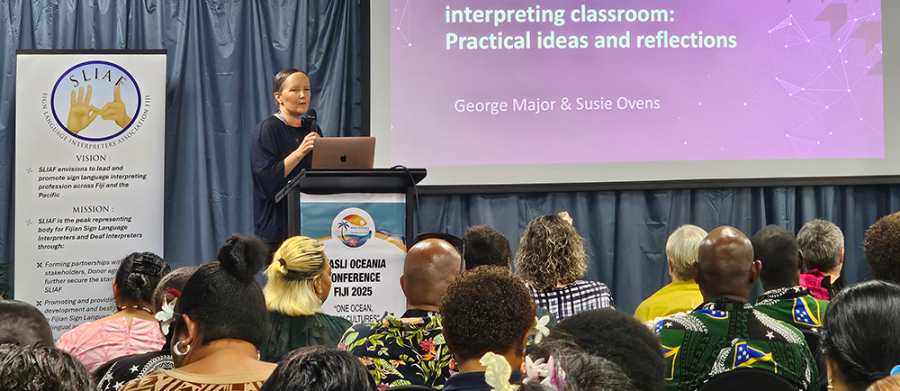
Service learning with Deaf groups is a required element for students who enrol in NZSL courses, such as visits to the Deaf Wellbeing Society and Deaf Seniors at Auckland Deaf Society, as well as the Ko Taku Reo Deaf Education Preschool and Tū Kōkiri. Service learning responds to community-identified needs while helping students develop their NZSL skills and cultural understanding. Due to their sensitive nature, opportunities for practicums in health contexts are rarely available, yet community interpreters are commonly called upon to work in these settings. To address this gap, the team decided to bring the health setting into the classroom through naturalistic recorded role-plays. In 2021, Susie and George (in collaboration with academics at Te Herenga Waka VUW and pharmacists) secured $19,000 external funding from the Ministry of Social Development to support the “Deaf Health Stories in NZSL” project. In an earlier project, the team asked Deaf people from around Aotearoa to describe the barriers they had faced in the health system. They created the NZSL health corpus for use in future linguistics research on NZSL.
"Everything the NZSL team does is underpinned by collaboration with the Deaf community. Our goal is to create a resilient community, support a healthy and vibrant language, and to graduate students who embody and actively practise allyship."
